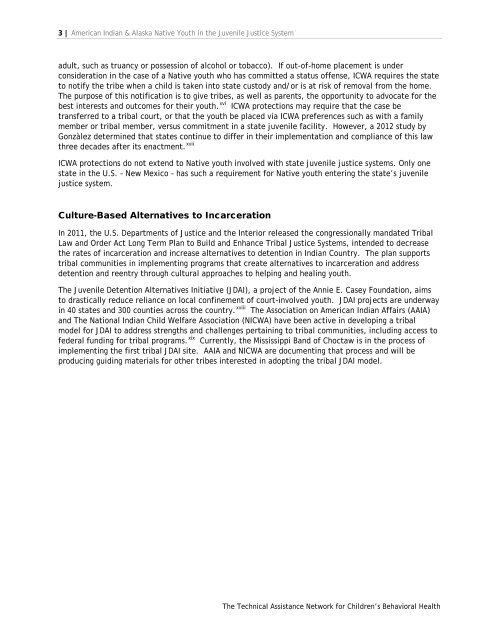Native American Youth In The Juvenile Justice System
Native American Youth In The Juvenile Justice System
Native American Youth In The Juvenile Justice System
You also want an ePaper? Increase the reach of your titles
YUMPU automatically turns print PDFs into web optimized ePapers that Google loves.
3 | <strong>American</strong> <strong>In</strong>dian & Alaska <strong>Native</strong> <strong>Youth</strong> in the <strong>Juvenile</strong> <strong>Justice</strong> <strong>System</strong><br />
adult, such as truancy or possession of alcohol or tobacco). If out-of-home placement is under<br />
consideration in the case of a <strong>Native</strong> youth who has committed a status offense, ICWA requires the state<br />
to notify the tribe when a child is taken into state custody and/or is at risk of removal from the home.<br />
<strong>The</strong> purpose of this notification is to give tribes, as well as parents, the opportunity to advocate for the<br />
best interests and outcomes for their youth. xvi ICWA protections may require that the case be<br />
transferred to a tribal court, or that the youth be placed via ICWA preferences such as with a family<br />
member or tribal member, versus commitment in a state juvenile facility. However, a 2012 study by<br />
Gonzàlez determined that states continue to differ in their implementation and compliance of this law<br />
three decades after its enactment. xvii<br />
ICWA protections do not extend to <strong>Native</strong> youth involved with state juvenile justice systems. Only one<br />
state in the U.S. – New Mexico – has such a requirement for <strong>Native</strong> youth entering the state’s juvenile<br />
justice system.<br />
Culture-Based Alternatives to <strong>In</strong>carceration<br />
<strong>In</strong> 2011, the U.S. Departments of <strong>Justice</strong> and the <strong>In</strong>terior released the congressionally mandated Tribal<br />
Law and Order Act Long Term Plan to Build and Enhance Tribal <strong>Justice</strong> <strong>System</strong>s, intended to decrease<br />
the rates of incarceration and increase alternatives to detention in <strong>In</strong>dian Country. <strong>The</strong> plan supports<br />
tribal communities in implementing programs that create alternatives to incarceration and address<br />
detention and reentry through cultural approaches to helping and healing youth.<br />
<strong>The</strong> <strong>Juvenile</strong> Detention Alternatives <strong>In</strong>itiative (JDAI), a project of the Annie E. Casey Foundation, aims<br />
to drastically reduce reliance on local confinement of court-involved youth. JDAI projects are underway<br />
in 40 states and 300 counties across the country. xviii <strong>The</strong> Association on <strong>American</strong> <strong>In</strong>dian Affairs (AAIA)<br />
and <strong>The</strong> National <strong>In</strong>dian Child Welfare Association (NICWA) have been active in developing a tribal<br />
model for JDAI to address strengths and challenges pertaining to tribal communities, including access to<br />
federal funding for tribal programs. xix Currently, the Mississippi Band of Choctaw is in the process of<br />
implementing the first tribal JDAI site. AAIA and NICWA are documenting that process and will be<br />
producing guiding materials for other tribes interested in adopting the tribal JDAI model.<br />
<strong>The</strong> Technical Assistance Network for Children’s Behavioral Health

















